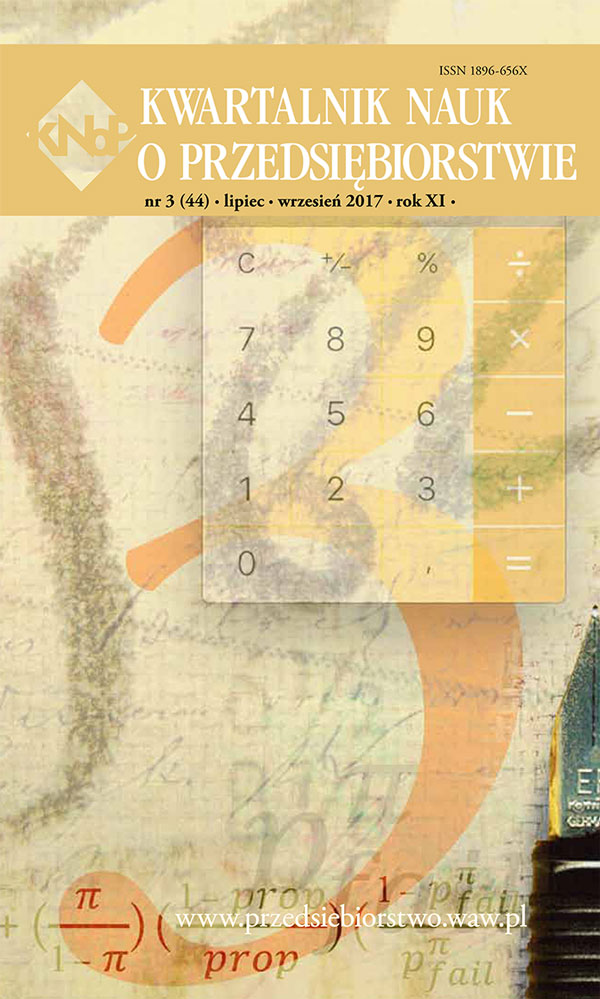Value appropriation as a factor of change of the management paradigm
Main Article Content
Abstract
The management paradigm is formulated both by the scientific environment, as well as by the managers of organisations. Both environments formulate management paradigms which relate to values. As far as the paradigm of the first group is relatively easy to identify, the second is much more difficult to define, as the analysis must be supplemented with the examination of the actual behaviour of enterprises. The article discusses the essential components of the paradigms formulated by both environments, including the common contents of these paradigms and the differences. The author suggested changes to both paradigms taking into account their interdependence.
Downloads
Article Details
The author of the article declares that the submitted article does not infringe the copyrights of third parties. The author agrees to subject the article to the review procedure and to make editorial changes. The author transfers, free of charge, to SGH Publishing House the author's economic rights to the work in the fields of exploitation listed in the Article 50 of the Act of 4 February 1994 on Copyright and Related Rights – provided that the work has been accepted for publication and published.
SGH Publishing House holds economic copyrights to all content of the journal. Placing the text of the article in a repository, on the author's home page or on any other page is allowed as long as it does not involve obtaining economic benefits, and the text will be provided with source information (including the title, year, number and internet address of the journal).
References
Ariely D. [2010], Zalety irracjonalności. Korzyści płynące z postępowania wbrew logice w domu i pracy, Wrocław, Wydawnictwo Dolnośląskie.
Black A., Wright P., Bachman J.E. [2000], W poszukiwaniu wartości dla akcjonariuszy. Kształtowanie wyników działalności spółek, Warszawa, Dom Wydawniczy ABC.
Bocheński J.M. [1993], Logika i filozofia. Wybór pism, Warszawa, Wydawnictwo Naukowe PWN.
Chang H.-J. [2013], 23 rzeczy, których nie mówią ci o kapitalizmie, Warszawa, Wydawnictwo Krytyki Politycznej.
Dembinski P.H. [2012], Ethics and the Economy: A Tense Relationship, in: Trust and Ethics in Finance Innovative. Ideas from the Robin Cosgrove Prize, C. Cosgrove-Sacks, P.H. Dembinski (eds.), Global 6, Globethics.net.
Gołębiowski G., Szczepanowski P. [2007], Analiza wartości przedsiębiorstwa, Warszawa, Difin.
Gulski B. [2017], Zjawisko zawłaszczania wartości a zachowania obronne przedsiębiorstw, Lublin, Wydawnictwo UMCS.
Hawawini G., Viallet C. [2007], Finanse menedżerskie. Kreowanie wartości dla akcjonariuszy, Warszawa, PWE.
Hoefle M. [2010], Managerism. Corporate Leadership in Distress, Weinheim, Germany, Wiley.
Jaki A. [2011], Imperatyw kreowania wartości a teorie przedsiębiorstwa, „Kwartalnik Nauk o Przedsiębiorstwie”, nr 2.
Kowalczewski W. [2008], Wybrane aspekty metodologii nauk o zarządzaniu, w: Współczesne paradygmaty nauk o zarządzaniu, W. Kowalczewski (red.), Warszawa, Difin.
Noga A. [2009], Teorie przedsiębiorstw, Warszawa, Polskie Wydawnictwo Ekonomiczne.
Osbert-Pociecha G. [2011], Ewolucja paradygmatów zarządzania a zarządzanie zmianami, w: Przełomy w zarządzaniu. Kontekst strategiczny, Z. Dworzecki, B. Nogalski (red.), Toruń, TNOiK, „Dom Organizatora”.
Rojek T. [2011], Analiza zmian wartości przedsiębiorstw, w: Restrukturyzacja. Teoria i praktyka w obliczu nowych wyzwań, A. Jaki, J. Kaczmarek, T. Rojek (red.), Kraków, UE w Krakowie.
Rokita J. [2008], O paradygmacie nauk o zarządzaniu raz jeszcze, w: Zarządzanie strategiczne. Podstawowe problemy, R. Krupski (red.), Prace Naukowe Wałbrzyskiej Wyższej Szkoły Zarządzania i Przedsiębiorczości. Seria: Zarządzanie, Wałbrzych.
Strebel P., Cantale S. [2014], Is Your Company Addicted to Value Extraction?, “MIT Sloan Management Review”, No. 55, Summer.
Suszyński C. [2007], Wyzwania na szczeblu przedsiębiorstwa – imperatyw kształtowania wartości, w: Przedsiębiorstwo, wartość, zarządzanie, C. Suszyński (red.), Warszawa, PWE.
Wawrzyniak B. [1999], Odnawianie przedsiębiorstwa. Na spotkanie XXI wieku, Warszawa, Poltext.

